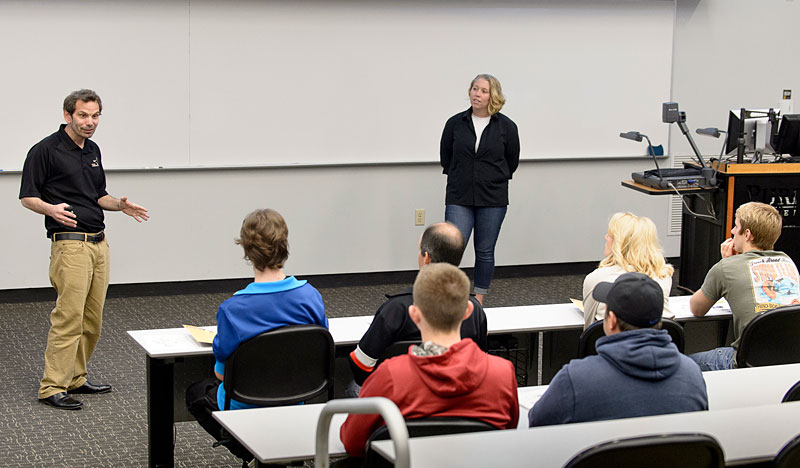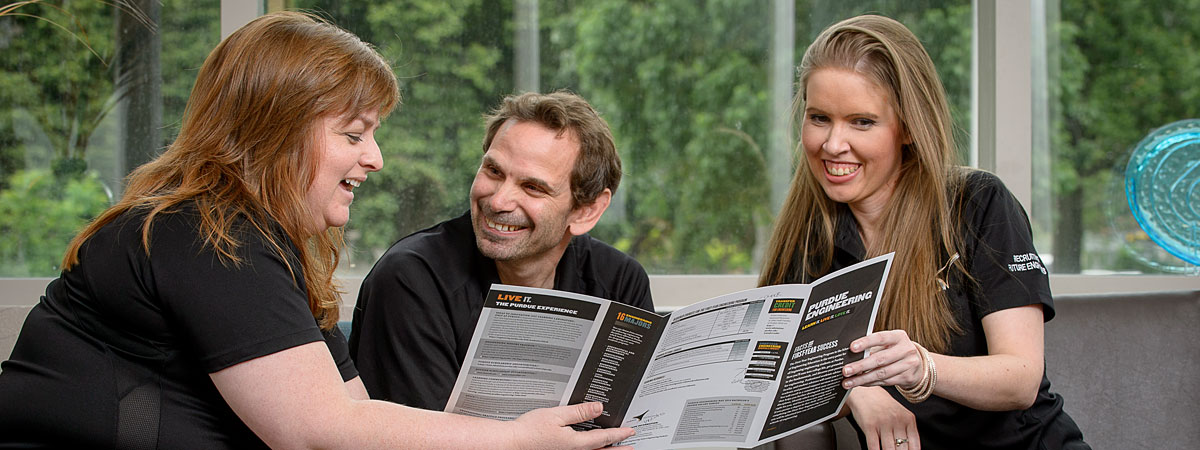Grooming success
Grooming success
| Author: | William Meiners |
|---|---|
| Magazine Section: | Strategic Growth Initiative |
| College or School: | CoE |
| Article Type: | Section Feature |
In just 15 years since the turn of the century, students are making choices about college destinations in decidedly different ways. Robust websites, fresh marketing pitches and social media campaigns have created a multifaceted, highly competitive recruiting landscape. David Bowker, however, believes nothing beats the personal connection that helps draw students to the College of Engineering at Purdue.

Bowker has witnessed that long view, beginning with his first professional days on Purdue’s campus in 2001, in what was then the Office of Recruitment housed in the Department of Freshman Engineering. He’s been involved in the administrative and institutional shifts, as well as the philosophical changes that focus more on identifying the right academic fit for students.
There’s no shortage of numerical measuring sticks when it comes to rating the effectiveness of engineering programs throughout the country. Rankings, retention rates and job-placement statistics draw the attention of both parents and potential students looking for an engineering home. Based on the numbers alone, the staffers in OFE do a staggering amount of work each year: hosting 350 events, pulling in 17,000 applications (an increase of 7,400 in seven years), making 30,000 in-person contacts and mailing 200,000 print and electronic media messages.
Don’t call it ‘recruitment’
As Freshman Engineering became the First-Year Engineering Program and morphed into part of the School of Engineering Education, a national first established in 2004, the need to “recruit” became less of a faculty obligation and something more for specialists like Bowker. It was also time to rethink the very implication of the “r” word used in attracting students.

Moving away from something akin to military recruitment or a sales pitch, Bowker says the idea of “future engineers” (another national first for a college office) helped to reframe the discussions Engineering staffers are having with potential students. Traditional messaging — We’re the best and you should come here — has been replaced with providing families with the best information about what Purdue Engineering is and how that aligns with their goals for higher education.
“We know we’re awesome, but we’re not awesome for everyone,” Bowker says. For those who will come here, OFE, which became official in December 2011, emphasizes the importance of ongoing relationships with students after they’ve paid their fees and signed up for classes.
High school presentations also became another avenue for talking about what engineers do for the world, as opposed to academic major options for the math, science or mechanically inclined. “We begin by talking about engineering as a helping profession that calls for a lot of creativity,” Bowker says. “I think Purdue helps educate some really well-rounded engineers. We work extremely closely with our Women in Engineering and Minority Engineering programs, which are national models, and that helps us resonate with a larger population.”
Still, with such an overwhelming number of applicants vying for 1,860 first-year engineering spots this year, one challenge becomes not to rely on a history of institutional excellence but rather make each campus visitor feel special. Bowker says they try to do this with a good dose of humor in an office he describes as “loud, busy and rambunctious,” as well as fiercely proud of Purdue Engineering.
As important as choosing the right college can be, there is room for some levity in the process. “As my colleague Amy Glenn, our associate director, often says, ‘You have to be part comedian and part lecturer,’” says Bowker, who believes Purdue is simply providing an opportunity for smart people to use the adaptive tools of technology to help improve life.
Strategic, student-focused growth
Nothing speaks to a prospective engineering student like students who are currently immersed in the program. OFE uses the talents of 14 undergraduate engineering students for presentations, social media campaigns and engineering campus tours. The students, representing many of the current 16 majors, are able to give fresh, firsthand accounts of their own educational experiences.

In their selected roles as spokespeople, those current students develop professional skills that help them stand out in the workplace. That forward-thinking philosophy, inspired by the “Engineer of 2020,” the National Academy of Engineering’s education initiative, gives even more credibility to the notion of well-rounded or “Renaissance engineer, who might just change the world.”
Additionally, Neil Armstrong Hall of Engineering, a testament to Purdue’s rich history, opened its doors in 2007 to provide an open-windowed look at state-of-the-art labs and classrooms that help foster the collaborative work of engineers. Indeed, Bowker says most high school students are excited knowing that they will spend much of their first year in Neil Armstrong Hall.
Engineering evolutions
In nearly a decade and a half, Bowker has seen the incredible growth of the College of Engineering at Purdue. He’s also participated in the “changing conversation” about its possibilities for young students. As OFE adds a fifth full-time staff member soon, the conversation itself is likely to continue evolving.
“Everything has become much more competitive since 2001,” Bowker says. “The focus on value and how that’s linked to investment has really changed. It’s gotten to the point where some families are really overwhelmed by the process and all the options.”
For his part, Bowker and his colleagues help alleviate that stress by helping students find their niche, even if it’s not within engineering. As for those engineers of 2020 who are going to graduate from Purdue and do incredible things in half a decade, Bowker is proud to be able to encourage them along an educational path. And maybe provide a little comic relief.

Comments